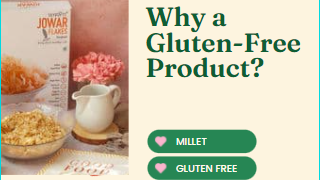Why A Gluten-Free Product?
It's maybe frustrating to follow a gluten-free diet. But with time, patience and creativity, you'll find there are many products that you already eat that are free from gluten and you will find substitutes for foods that contain gluten that you can enjoy.
It's surprising to realize how many products that contain zero gluten, such as bread and pasta, are now available. Many specialty grocery stores sell gluten-free products. If you can't find them in your area, check with a celiac support group or go online. For a starter, it's a good idea to consult a dietitian who can answer your questions and offer advice about how to avoid gluten while still eating a healthy, balanced diet.
Foods that are allowed
Many healthy and delicious foods are naturally gluten-free:
Try Our Healthy Gluten-Free Products Now @ www.skyroots.in
Beans, seeds, nuts in their natural, fresh eggs, fresh meats, fish and poultry, fruits and vegetables, most dairy products.
It's important to make sure that they are not processed or mixed with gluten-containing grains, additives, or preservatives.
Many grains and starches can be part of this diet:
Amaranth, arrowroot, buckwheat, corn and cornmeal, flax, gluten-free flours, hominy, millet, quinoa, rice, sorghum, soy, tapioca, teff.
Foods to avoid
Avoid all food and drinks containing:
Barley, rye, triticale, wheat.
Avoiding wheat can be challenging because wheat products go by numerous names. Consider the many types of wheat flour on supermarket shelves - bromated, enriched, plain, and self-rising. Here are other wheat products to avoid:
Bulgur, durum flour, farina, graham flour, kamut, semolina, spelt.
Foods without labeling 'gluten-free' should be avoided too
Beer, bread, cakes and pies, candies, cereals, cookies and crackers, croutons, french fries, gravies, imitation meat or seafood, matzo, pasta, processed luncheon meats, salad dressings, sauces, including soy sauce, seasoned rice mixes, seasoned snack foods, such as potato and tortilla chips, self-basting poultry, soups and soup bases, vegetables in sauce.
Certain grains, such as oats, can be contaminated with wheat during the growing and processing stages of production. For this reason, doctors and dietitians generally recommend avoiding oats unless they are specifically labeled free from gluten.




Comments
Post a Comment